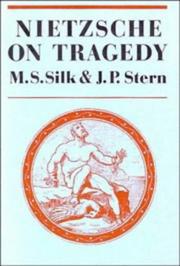| Listing 1 - 4 of 4 |
Sort by
|
Book
ISBN: 019925382X Year: 2002 Publisher: Oxford : Oxford university press,
Abstract | Keywords | Export | Availability | Bookmark
 Loading...
Loading...Choose an application
- Reference Manager
- EndNote
- RefWorks (Direct export to RefWorks)

ISBN: 0521232627 9780521232623 Year: 1981 Publisher: Cambridge: Cambridge university press,
Abstract | Keywords | Export | Availability | Bookmark
 Loading...
Loading...Choose an application
- Reference Manager
- EndNote
- RefWorks (Direct export to RefWorks)
German literature --- Drama --- Nietzsche, Friedrich W. --- Tragic, The --- Tragedy --- Greek drama (Tragedy) --- Aesthetics --- Music --- History and criticism --- Philosophy and aesthetics --- Nietzsche, Friedrich Wilhelm, --- -Music --- -Tragedy --- Art music --- Art music, Western --- Classical music --- Musical compositions --- Musical works --- Serious music --- Western art music --- Western music (Western countries) --- Beautiful, The --- Beauty --- Esthetics --- Taste (Aesthetics) --- Philosophy --- Art --- Criticism --- Literature --- Proportion --- Symmetry --- Psychology --- Nietzsche, Friedrich Wilhelm --- Aesthetics. --- Tragedy. --- Tragic, The. --- History and criticism. --- Philosophy and aesthetics. --- Nietzsche, Friedrich --- Hermeneutics (Music) --- Musical aesthetics --- Music theory --- Radio broadcasting Aesthetics --- Greek drama (Tragedy) - History and criticism --- Music - Philosophy and aesthetics --- Nietzsche, Friedrich Wilhelm, - 1844-1900

ISBN: 0521272556 0521232627 Year: 1984 Publisher: Cambridage : Cambridage university press,
Abstract | Keywords | Export | Availability | Bookmark
 Loading...
Loading...Choose an application
- Reference Manager
- EndNote
- RefWorks (Direct export to RefWorks)
This is the first comprehensive study of Nietzsche's earliest (and extraordinary) book, The Birth of Tragedy (1872). When he wrote it, Nietzsche was a Greek scholar, a friend and champion of Wagner, and a philosopher in the making. His book has been very influential and widely read, but has always posed great difficulties for readers because of the particular way Nietzsche brings his ancient and modern interests together. The proper appreciation of such a work requires access to ideas that cross the boundaries of conventional specialisms. This is now provided by M. S. Silk and J. P. Stern in their joint study of Nietzsche's book. They examine in detail its content, style and form; its strange genesis and hybrid status; its biographical background and the controversy engendered by its publication; its value as an account of ancient Greek culture and as a theory of tragedy and music; its relation to other theories of tragedy; and its place in the history of German ideas and in Nietzsche's own philosophical career.
#GGSB: Filosofie (19e eeuw) --- Aesthetics --- Greek drama (Tragedy) --- -Music --- -Tragedy --- Tragic, The --- Drama --- Art music --- Art music, Western --- Classical music --- Musical compositions --- Musical works --- Serious music --- Western art music --- Western music (Western countries) --- Philosophy --- Art --- Criticism --- Literature --- Proportion --- Symmetry --- Beautiful, The --- Beauty --- Esthetics --- Taste (Aesthetics) --- History and criticism --- Philosophy and aesthetics --- Psychology --- Nietzsche, Friedrich Wilhelm --- Music --- Tragedy. --- Tragic, The. --- Philosophy and aesthetics. --- History and criticism. --- Nietzsche, Friedrich Wilhelm, --- Filosofie (19e eeuw) --- Radio broadcasting Aesthetics
Book
ISBN: 1316566714 1316534782 1316564339 1107144760 1316507939 9781316507933 9781107144767 Year: 2016 Publisher: New York: Cambridge university press,
Abstract | Keywords | Export | Availability | Bookmark
 Loading...
Loading...Choose an application
- Reference Manager
- EndNote
- RefWorks (Direct export to RefWorks)
The first comprehensive study of Nietzsche's earliest book, The Birth of Tragedy (1872), this important volume by M. S. Silk and J. P. Stern examines the work in detail: its place in Nietzsche's philosophical career; its value as an account of ancient Greek culture; its place in the history of German ideas, and its value as a theory of tragedy and music. Presented in a fresh twenty-first-century series livery, and including a specially commissioned preface written by Lesley Chamberlain, illuminating its enduring importance and relevance to philosophical enquiry, this accessible study has been revived for a new generation of readers.
Aesthetics. --- Music --- Greek drama (Tragedy) --- Hermeneutics (Music) --- Musical aesthetics --- Aesthetics --- Music theory --- Beautiful, The --- Beauty --- Esthetics --- Taste (Aesthetics) --- Philosophy --- Art --- Criticism --- Literature --- Proportion --- Symmetry --- Philosophy and aesthetics. --- History and criticism. --- Psychology --- Nietzsche, Friedrich Wilhelm, --- Tragedy. --- Tragic, The. --- Drama --- Radio broadcasting Aesthetics --- Music - Philosophy and aesthetics. --- Greek drama (Tragedy) - History and criticism --- Tragedy --- Tragic, The --- Nietzsche, Friedrich Wilhelm, - 1844-1900. - Geburt der Tragödie
| Listing 1 - 4 of 4 |
Sort by
|

 Search
Search Feedback
Feedback About UniCat
About UniCat  Help
Help News
News